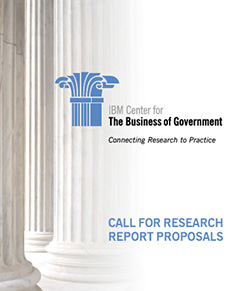
Announcing the Center’s Newest Research Report Topics

We are pleased to announce our latest round of awards for new reports on key public sector challenges, which respond to priorities identified in the Center's research agenda. Our content is intended to stimulate and accelerate the production of practical research that benefits public sector leaders and managers.
We expect the following reports to be published in early 2018. Short summaries of each report follow.
Modernizing Government IT by Dr. Gregory S. Dawson, Arizona State University
Federal, State and local governments all face the challenge of delivering programs and services on often outdated IT systems. The ability to successfully implement new technologies depends on interconnected data stores and a substantial technology modernization effort. The federal government can expand on strategies that have started to be introduced by agencies, and can learn from successful efforts of state and local governments. This report will draw out these lessons learned from successful modernizations to be applied at all levels of government.
Attributes of Effective Program Management by Janet Weiss, University of Michigan
This report will identify the attributes of effective program management in government. Skillful program managers are essential for strong program performance across the federal government. The Program Management Improvement and Accountability Act of 2016 aims to increase the number of program managers with the skills to be effective in leading significant initiatives to improve performance, and to support program managers in the challenging work that they do. This report will map of how federal program settings vary in ways that matter for the skills of program managers in the agencies, resulting in a proposed taxonomy to help identify skills needed by program managers in different settings and to promote effective practices among program managers working in similar settings. The report will also explore characteristics of successful program management for government in a digital world.
Blockchain in Government by Thomas Hardjono, Massachusetts Institute of Technology
This report will include provide an overview of how the new technology of blockchain can effectively be leveraged by government, drawing on a series of discussions hosted by the Congressional Blockchain caucus. The report will review digital identity guidelines, enrollment and identity proofing, authentication and lifecycle management, and federation and assertions as they relates to blockchain in government. The report will provide suggested considerations and recommendations for successful introduction and implementation blockchain across the public sector.
Combining Big Data and Thick Data to Improve Services Delivery by Yuen Yuen Ang, University of Michigan
Big data can be overwhelming and have little utility if the data is “thin”—where there is very little meaningful information about vast amounts of data. The value of big data can be greatly enhanced by combining it with "thick" data, that adds context based on insights into what users want from data and how they consume services based on that data. This research report will present several case studies of organizations that have combined big and thick data to improve the delivery of government services. It draws lessons from these cases that can be applied to throughout government.
Developing an Enterprise Approach to Federal Policy Governing U.S. Military Veterans by Nicholas J. Armstrong of the Institute for Veterans and Military Families, J. Michael Haynie of Syracuse University, and David M. Van Slyke of Syracuse University
This report will examine how cross-agency governing mechanisms are impacting the implementation of an enterprise planning approach to guide U.S. veterans policy. The VA boasts the second largest agency budget, develops an internal strategic plan, and provides a range of health services and benefits—but to fewer than half of all veterans. No mechanism exists to align and allocate resources across the public, private, and non-profit sectors, which serve all veterans. This challenge extends beyond any single federal agency. Drawing upon expert interviews and targeted surveys, this report will offer recommendations to drive greater unity of effort on U.S. veterans policy.
Integrating and Analyzing Data Within and Across Government - Key to 21st Century Security by Douglas Lute, Harvard Kennedy School's Belfer Center, and Francis Taylor, Center for Strategic and International Studies.
This report will focus on data gathering, analysis and dissemination challenges across the homeland security enterprise. It will address how these challenges will help DHS and stakeholders in the US and Europe increase the understanding of how best to leverage technology in meeting strategic, mission and operational needs. The report will highlight opportunities for governments to leverage data integration and analytics to support better decision making around cyber and homeland security.



